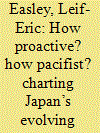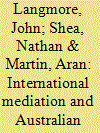|
|
|
Sort Order |
|
|
|
Items / Page
|
|
|
|
|
|
|
| Srl | Item |
| 1 |
ID:
151987


|
|
|
|
|
| Summary/Abstract |
Since the Asian financial crisis, the Association of Southeast Asian Nations (ASEAN) has sought to reorient itself towards becoming a ‘people-oriented’ association. Democratic transitions in the region and increased demands from civil society to be actively involved in regional governance have prompted ASEAN to develop forms of participatory regionalism. In practice, however, the rhetorical aspirations of ASEAN have not often matched the level of participation or support expected by civil society organisations. It has often been the case that ASEAN's decisions, especially those related to sensitive issues, have been influenced by external pressure as opposed to participatory mechanisms. The aim of this article is to determine to what extent participatory mechanisms impact ASEAN's approach to non-traditional security. By doing so, the authors combine two key elements central to a ‘people-oriented’ approach to regionalism: the incorporation of deliberative and participatory processes and the acknowledgement of transboundary security issues which require cooperation to move beyond state-centric approaches. This article explains that despite the rhetorical emphasis on participatory regionalism, it continues to be the case that regional civil society organisations and non-state actors have limited capacity to influence ASEAN. By providing a critical analysis of influences on ASEAN's non-traditional security policies, the authors offer a modest yet valuable contribution to the emerging literature on ASEAN's ‘people-oriented’ regionalism and advance a nuanced understanding of ASEAN's participatory mechanisms.
|
|
|
|
|
|
|
|
|
|
|
|
|
|
|
|
| 2 |
ID:
151990


|
|
|
|
|
| Summary/Abstract |
After 60 years maintaining Self-Defense Forces rather than a normal military, Japan is moving towards exercising collective self-defence, long restricted by interpretations of its 1945 Peace Constitution. The merits of Prime Minister Abe Shinzo's ‘proactive pacifism’ are intensely debated by those welcoming greater international contributions from Japan and others suspicious of Japanese ‘remilitarisation’. A nation’s defence posture can theoretically be hijacked by aggressive nationalists, shift to pacifist isolationism, or rely on non-military internationalism or multilateral security cooperation. This article assesses competing explanations about the post-war trajectory of Japan’s defence posture by charting variation in military doctrine and capabilities. The analysis finds that Tokyo has made incremental policy adjustments under domestic and international constraints, and is not aggressively remilitarising.
|
|
|
|
|
|
|
|
|
|
|
|
|
|
|
|
| 3 |
ID:
151991


|
|
|
|
|
| Summary/Abstract |
In October 2012, Australia's parliamentary Joint Standing Committee on Foreign Affairs, Defence and Trade recommended that a mediation support unit should be created within the Australian Agency for International Development, a department now amalgamated with the Department of Foreign Affairs and Trade. The question is: Does Australia possess the motivation and capacity to implement active and effective international mediation by building the capacity of intermediaries to deploy various peacemaking methods to hasten de-escalation at different stages of a conflict? If not, is a mediation support unit an appropriate initiative to address this capability gap? This article draws on quantitative conflict data sets and an expert panel to conclude that Australia's track record demonstrates significant capacity to undertake international mediation, but that the mediation personnel and processes available to government are insufficiently resourced and coordinated to readily provide policymakers with accessible tools to undertake the diverse range of mediation strategies advocated by conflict scholars. While a mediation support unit would address some of these issues, at present it conflicts with the Department of Foreign Affairs and Trade's institutional philosophy based on diffused expertise.
|
|
|
|
|
|
|
|
|
|
|
|
|
|
|
|
| 4 |
ID:
151992


|
|
|
|
|
| Summary/Abstract |
One of the biggest challenges for the East Asian region today is the Sino-Japanese relationship. Starting with the fishing trawler incident in September 2010, followed by Japan's nationalisation of the Senkaku/Diaoyu Islands, this relationship is experiencing an escalation of tensions in most, if not all, areas of the bilateral relationship. In response to the intensifying competition, China and Japan have elevated the importance of South-East Asia and the Association of Southeast Asian Nations (ASEAN) in their foreign policy strategies. Focusing on how elites from five South-East Asian states—Indonesia, Malaysia, the Philippines, Singapore and Vietnam—perceive the engagement of China and Japan with the region, this article poses two questions: (1) How do South-East Asian elites view the Sino-Japanese competition? and (2) How do South-East Asian elites view the role of ASEAN in managing the competition? The analysis here concludes that while some South-East Asian elites see opportunities in the Sino-Japanese competition, they nevertheless do not perceive it as an issue of critical significance. Instead, the concern lies generally with major-power dynamics, and particularly with Sino-US relations. ASEAN is viewed to lack the ability to manage the negative consequences of the Sino-Japanese competition, although its external balancing function has perceptibly helped to restrain any escalation of major-power tensions.
|
|
|
|
|
|
|
|
|
|
|
|
|
|
|
|
| 5 |
ID:
151988


|
|
|
|
|
| Summary/Abstract |
This article analyses the Bali Process in the context of Australia’s securitised approach to migrant smuggling, and the consequences this has for both the Australia–Indonesia diplomatic relationship and the Bali Process overall. The Bali Process is the premier regional forum for combating migrant smuggling and is well placed to discuss and develop regional cooperation policies on irregular migration within the region. In particular, the Bali Process remains a key domain where Australia and Indonesia can contest and amend the norms and practices around the human rights of refugees and asylum-seekers. This article traces and analyses the emergence of Australia’s bilateral agreements for offshore processing and resettlement between 2011 and 2014, which Australian political elites aligned rhetorically to the Bali Process, but which the authors argue remain in tension with stated Bali Process objectives in terms of rights and protections for asylum-seekers and refugees. This article identifies that Australia’s security-driven policies and regional disagreements over humanitarian responsibility remain an ongoing tension within Bali Process states, and provides commentary on the implications of this for future Australian policy relating to regional cooperation on irregular migration.
|
|
|
|
|
|
|
|
|
|
|
|
|
|
|
|
|
|
|
|
|